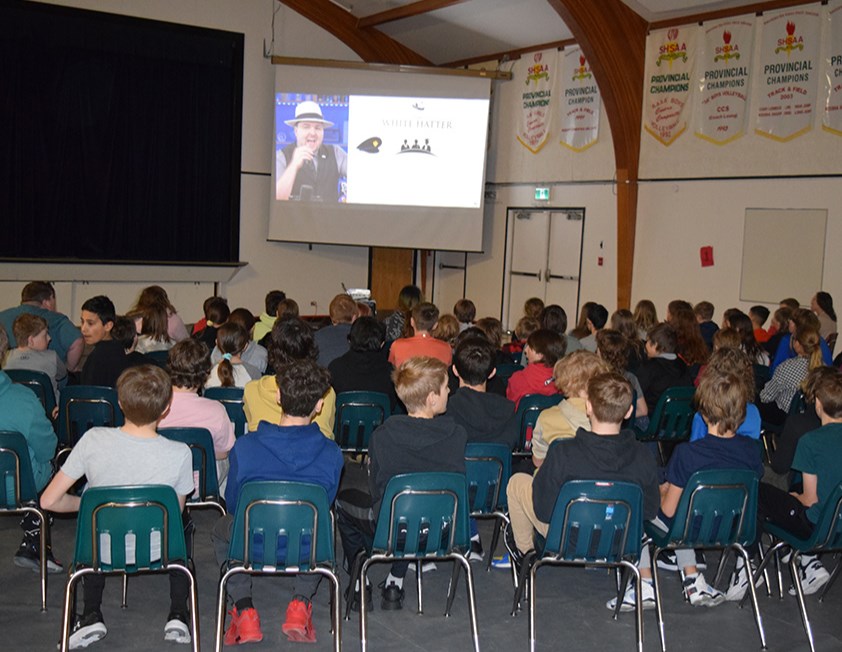CANORA - “We’re here to assist you in how to use the internet more effectively.”
With that, trained investigator Brandon Laur introduced students at Canora Composite School to the live broadcast from White Hatter Broadcasting Studio on March 27.
Laur clearly reminded students that his goal was to help them, but said, “You have to choose how to protect yourself and create better online experiences,” and added that, “When it comes to online crime, anything with damages under $5,000 will likely not be investigated. Cybercriminals in another country may not be arrested or even found.”
Students were urged to remember that they all need to prevent the occurrence of online challenges such as hacking, scamming or other trickery.
Laur emphasized that one of the worst things a person can do is always use the same password for all of their online accounts. If someone is tricked into sharing their password online, “The hacker will quickly try that password to hack any and all of your other accounts.”
Students were told that user error is probably the biggest aid in helping hackers be successful, including unsafe downloads or bad software.
“Be sure to only download from proper online stores,” said Laur.
What makes a better App?
- Apps that are more popular are likely safer.
- Ensure you have the ability to block, delete and remove people.
- Make sure the App allows you to privatize your account (you choose who can send you a message).
- Make sure the App allows you built-in reporting, so you can report someone who does something that makes you uncomfortable.
Laur said one of his favourite things about the internet is that almost anything as possible, but unfortunately that can be good or bad.
Often websites are the best tools for hackers and scammers, which includes the domain, the website name and subdomains, “where hackers can hide just about whatever they’re doing.” This includes trying to get someone to click on a subscription renewal notice for something they may not even have subscribed to.
Laur emphasized to never pay for something through a link someone sends you, but rather always log into the website directly.
The online locations most in danger of being hacked are usually the most popular ones, since hackers like to go where they can find the most people.
Recovering from a hack
- Change your password quickly. The longer you take, the worse things will probably get.
- Even though there is a cost involved, install anti-virus software.
- Check that your email is secure.
- If all else fails, completely resent your computer. Go into “settings” and clean everything out.
Laur told the students, “Email needs to be your most important account.”
Even if you have different passwords for all your accounts, there still could be trouble. If a person forgets a password, they can click on “Forgot Password” and press a button for a link. If a hacker is in that email account, they just have to do a password reset to their own password. The hacker can then change the ownership of the account and make it very difficult to get back.
Why would someone hack you?
- Steal your ID to do something illegal, and then you get the blame if they get caught.
- 10 or 20 years from now, when you might have more money, you could get hacked from your old unsecured account(s) if you’re not careful now.
Cyberbullying
Laur reminded students that, “If you’re targeted by bullies, there is a network of people who want to help you.”
Bullying can be thought of as intentionally making another person feel bad.
If someone is being mean and rude, the first thing to do is to block, remove and delete them.
If they persist, possibly on other electronic devices, probably the best thing to do is record them.
“Take a picture of the computer screen and save it,” said Laur. “Report it, show it to someone who can help make that person stop. It could be a family member, a teacher, or if something illegal is involved, the police.”
Laur used an example of an online situation that is becoming much too common. A message might start with, “I think you’re super cute. How about you send me a nude photo. I promise I will keep it private.”
But usually it’s all a lie. Scammers will say anything to gain your trust. Then the online conversation often changes, for example, “If you don’t send $500 (or do what I want) I’ll let everyone know about the picture.”
Laur emphasized that this is illegal, and should be reported to the police. “They are experts at this and good at finding these people.”
In closing, Laur reminded the students, “You need to create a positive online environment for yourself where you get to choose who you interact with.
Don't count on social media to deliver your local news to you. Keep your news a touch away by bookmarking Canora Courier's homepage at this link.
Bookmark SASKTODAY.ca, Saskatchewan's home page, at this link.




